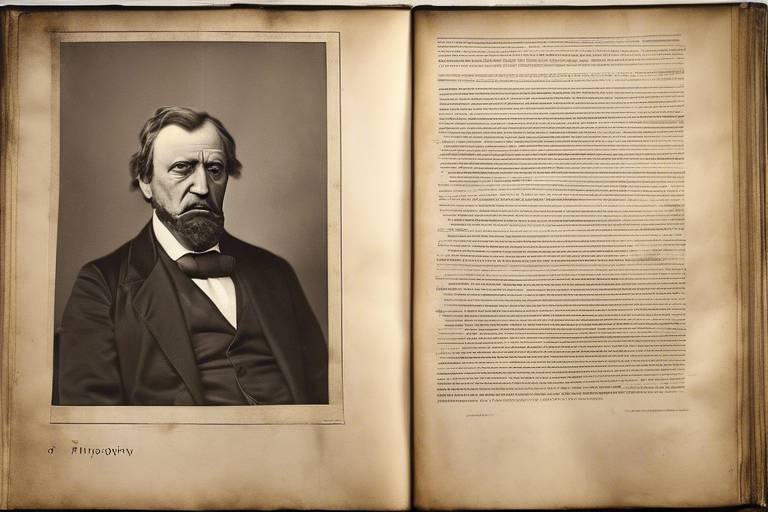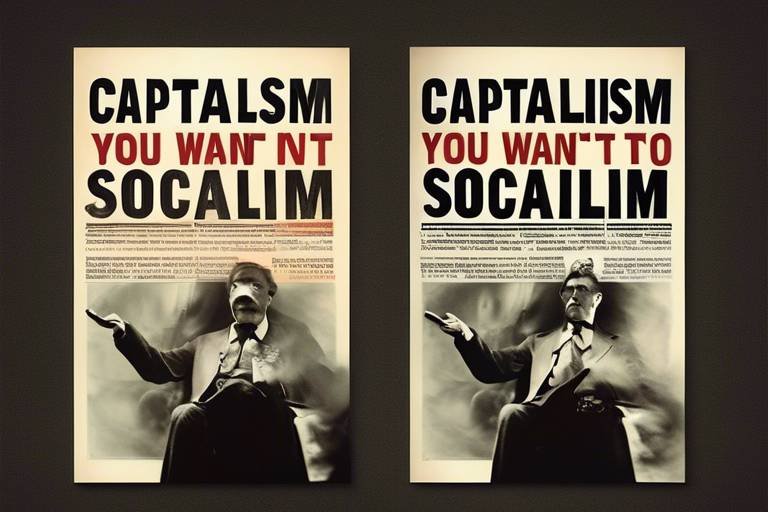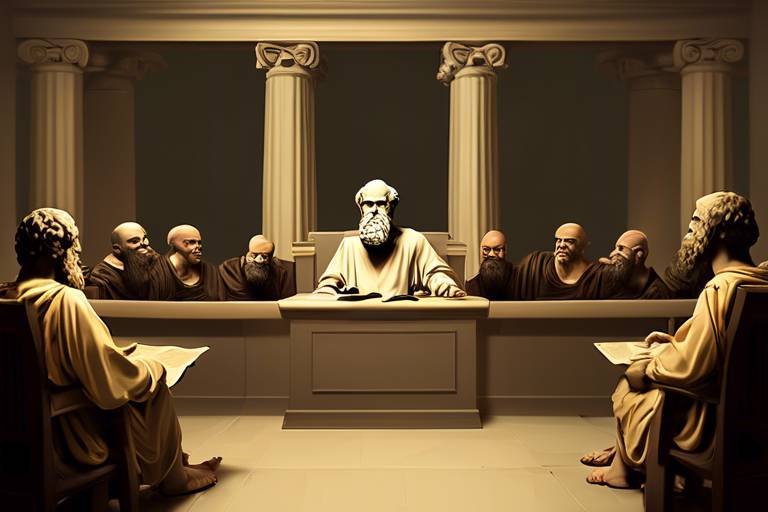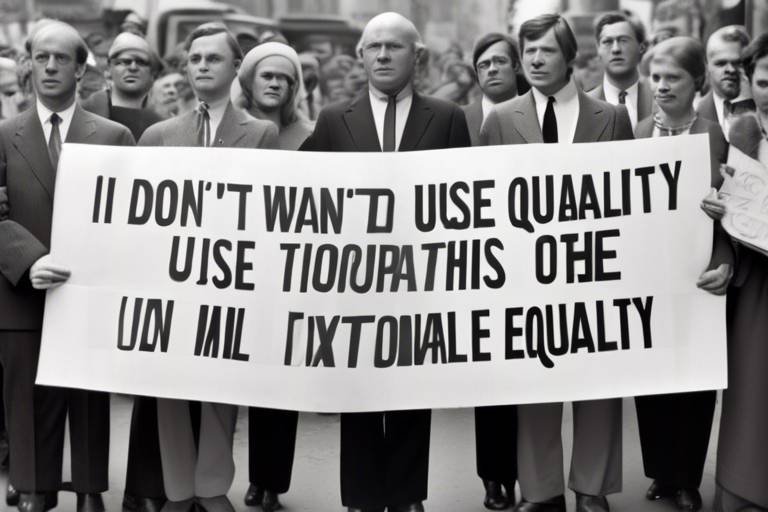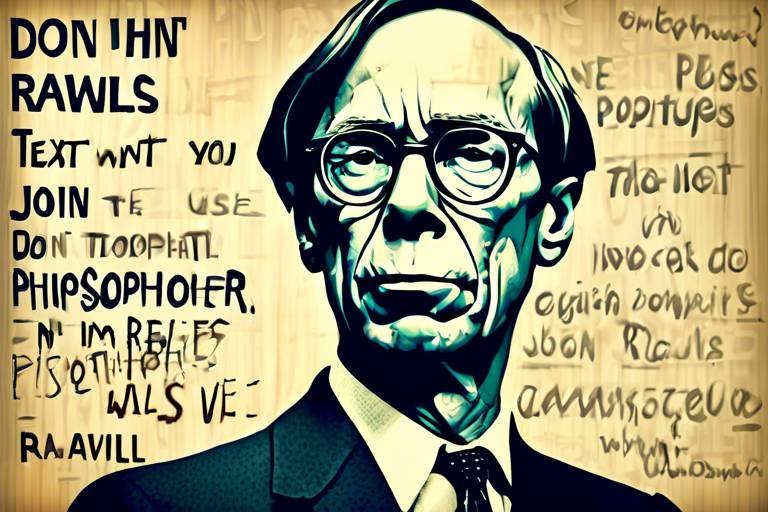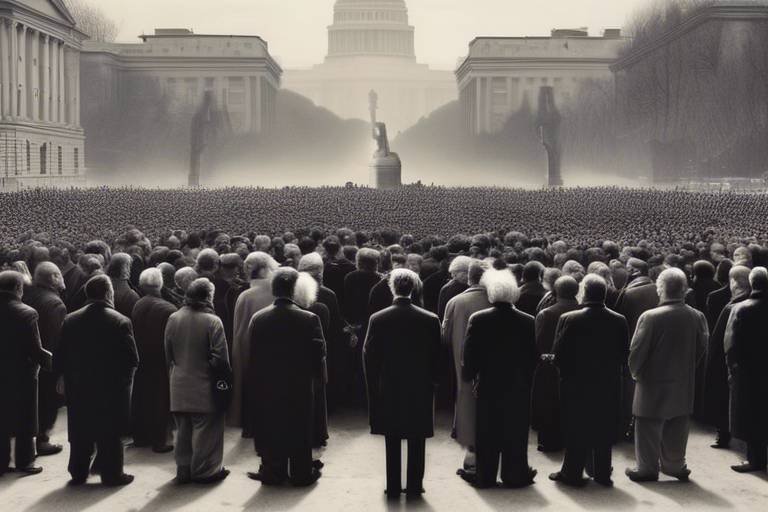Does a Leader's Personal Philosophy Shape their Political Approach?
In the complex world of politics, the interplay between a leader's personal philosophy and their political strategies is a fascinating subject that deserves careful exploration. Just as a compass guides a sailor, a leader's beliefs and values can steer their decisions, policies, and overall approach to governance. Think about it: when a leader stands before the public, their personal philosophy isn't just a backdrop; it's the very lens through which they view the world. It shapes their priorities, influences their actions, and ultimately defines their legacy.
Imagine a leader who strongly believes in social justice. This belief will likely manifest in their policies, pushing them to advocate for equal rights, healthcare access, and education reform. Conversely, a leader whose philosophy prioritizes economic growth might focus on deregulation and tax cuts. The core of their personal beliefs can either bridge gaps or widen divides in society, making it essential to understand how these philosophies play out in real political contexts.
Moreover, the influence of these philosophies extends beyond mere policy-making. It touches on the emotional and psychological aspects of leadership. A leader who genuinely believes in their cause can inspire others, rallying support and fostering a sense of community among constituents. This emotional connection can be pivotal during election seasons, where voters often seek authenticity and alignment with their values. Thus, the question arises: can a leader's personal philosophy truly predict their political success? The answer may lie in the alignment between their beliefs and the needs of the populace.
To illustrate this, consider the role of ethics in decision-making. A leader's ethical framework not only guides their choices but also shapes public trust. When leaders act in accordance with their stated beliefs, they build credibility and foster loyalty among their supporters. However, when there is a disconnect between a leader's philosophy and their actions, the fallout can be significant, leading to public disillusionment and loss of support.
As we delve deeper into this topic, it becomes clear that a leader's personal philosophy is not just a personal trait; it is a powerful force that can shape political landscapes. By examining case studies of leaders who have successfully integrated their philosophies into their governance, we can glean valuable insights into the importance of ethical leadership and its impact on public perception.
- How does a leader's personal philosophy influence their decision-making?
A leader's personal philosophy serves as a guiding framework, informing their choices and priorities, which can significantly affect their political strategies. - Can a leader's philosophy change over time?
Yes, a leader's philosophy can evolve due to personal experiences, changing societal values, or political pressures, impacting their governance style. - What role does public perception play in a leader's effectiveness?
Public perception is crucial; leaders who resonate with the values and beliefs of their constituents are often more successful in garnering support and achieving their political goals.

The Role of Personal Philosophy in Leadership
Understanding how personal philosophies inform leadership styles can reveal much about a leader's decision-making processes and priorities. Think about it: a leader's beliefs are like the compass guiding their actions. When they face a fork in the road, it's their core values that help them choose which path to take. This interplay between personal philosophy and leadership is crucial because it directly affects not just the leader's effectiveness but also the overall political landscape. For instance, a leader who values transparency is likely to foster a culture of openness within their administration, which can lead to increased public trust.
Moreover, personal philosophy shapes how leaders perceive challenges and opportunities. A leader with a strong belief in social justice might prioritize policies that address inequality, while another who values economic growth might focus on business-friendly initiatives. This divergence in focus can create distinct political climates, affecting everything from legislation to public opinion. In essence, a leader's philosophy acts as a lens through which they interpret the world, influencing their political approach in profound ways.
It's also important to recognize that personal philosophies are not formed in a vacuum. They are often influenced by a myriad of factors, including cultural background, education, and life experiences. These elements contribute to the unique perspectives that leaders bring to their roles. For example, a leader who grew up in a community that values communal support may prioritize policies that promote social welfare, whereas another who has experienced economic hardship might focus on job creation and economic reform.
In political contexts, the alignment—or misalignment—of a leader's personal philosophy with their constituents' values can significantly impact their political capital. When leaders embody the beliefs and values of their followers, they are more likely to garner support and trust. Conversely, when their actions contradict their stated beliefs, they risk alienating their base. This dynamic illustrates the critical role that personal philosophy plays in not only shaping leadership styles but also in determining a leader's longevity and success in office.
To further illustrate this point, let’s consider a few examples of leaders whose personal philosophies have significantly influenced their political approaches:
| Leader | Personal Philosophy | Political Approach |
|---|---|---|
| Nelson Mandela | Equality and Reconciliation | Focus on peace, unity, and dismantling apartheid |
| Margaret Thatcher | Individualism and Free Market | Emphasis on deregulation and privatization |
| Barack Obama | Hope and Change | Focus on healthcare reform and social justice |
In conclusion, the role of personal philosophy in leadership is not merely academic; it is a practical reality that shapes the political landscape. By understanding the philosophical underpinnings of a leader's decisions, we can better grasp the complexities of their political strategies and the implications for society as a whole.
- How does a leader's personal philosophy impact their decision-making?
A leader's personal philosophy serves as a guiding framework that influences their choices and actions, shaping policies and strategies. - Can a leader's philosophy change over time?
Yes, a leader's philosophy can evolve based on experiences, public feedback, and changing societal values. - Why is it important to understand a leader's personal beliefs?
Understanding a leader's beliefs can provide insights into their motivations and the potential direction of their policies.

Influence of Ethics on Political Decisions
When we think about politics, the first thing that often comes to mind is the clash of ideas, the debates, and the endless discussions about policies that shape our lives. But what underpins these decisions? The answer often lies in a leader's ethical beliefs. These beliefs serve as a compass, guiding leaders through the murky waters of political choices, and ultimately shaping their stances on critical issues. Imagine a ship navigating through a storm; the captain's values are the guiding stars that help steer it safely to shore.
Ethics in politics is not just a lofty ideal; it’s a fundamental aspect that can make or break a leader's credibility and effectiveness. For instance, consider how a leader's commitment to honesty can influence their approach to governance. When leaders prioritize transparency, they foster public trust, which is essential for maintaining a healthy relationship with constituents. Conversely, when ethical lapses occur, such as corruption or dishonesty, the fallout can be devastating, leading to loss of support and even political downfall.
Furthermore, ethical beliefs can significantly impact a leader's stance on social issues. Take, for example, leaders who advocate for social justice. Their ethical frameworks often push them to champion policies that aim to correct inequalities and provide support for marginalized communities. This not only resonates with voters who share similar values but also positions the leader as a moral authority in the political landscape. In contrast, leaders whose ethics prioritize economic gain over social welfare may find themselves at odds with the public, especially during times of crisis.
To illustrate this point, let's look at a few key areas where ethics play a pivotal role in political decisions:
- Governance: Ethical leaders are more likely to implement policies that promote fairness and accountability.
- Public Trust: A strong ethical foundation helps build trust between leaders and their constituents.
- Social Issues: Leaders with a commitment to ethics often advocate for policies that support equality and justice.
However, it’s important to recognize that ethical leadership is not without its challenges. Leaders frequently grapple with dilemmas where their ethical beliefs clash with political pressures. For instance, a leader may face a situation where a popular decision contradicts their moral stance. In such cases, the struggle to align personal ethics with practical governance can lead to difficult choices, illustrating the complexities of political life. This tug-of-war often tests a leader's resolve and commitment to their principles.
Ultimately, the influence of ethics on political decisions cannot be overstated. A leader's ethical framework not only shapes their policies but also affects their relationship with the public. As constituents become increasingly aware of the ethical implications of political decisions, they are more likely to support leaders who reflect their values. This creates a dynamic interplay between ethics and politics, where the two are inextricably linked.
- How do ethical beliefs influence political decisions?
Ethical beliefs act as a guiding framework for leaders, helping them navigate complex political landscapes and make choices that align with their values. - What happens when a leader’s ethics clash with political pressures?
Leaders may face difficult dilemmas where they must choose between personal principles and popular demands, which can lead to significant challenges in governance. - Can ethical leadership impact public trust?
Yes, leaders who prioritize ethics tend to foster greater public trust, as transparency and accountability resonate with constituents.

Values and Policy Formation
When we delve into the realm of policy formation, it becomes evident that a leader's core values play a pivotal role in shaping the initiatives they champion. These values act as a compass, guiding leaders in their decision-making processes and influencing the policies they advocate. Think of it like a chef crafting a signature dish; the ingredients (values) they choose will determine the flavor (policy) of the final meal. If a leader places a high value on social equity, for instance, we can expect their policies to reflect this commitment through initiatives aimed at reducing inequality and promoting inclusivity.
Moreover, the relationship between values and policy formation is not just a one-way street. As policies are implemented, they can, in turn, reinforce or challenge a leader's underlying values. This dynamic interplay is crucial; for example, a leader who prioritizes environmental sustainability may introduce policies aimed at reducing carbon emissions. However, if these policies face backlash or fail to achieve the desired outcomes, the leader might find themselves reevaluating their values or the effectiveness of their approach. This cycle of reflection and adaptation is essential for effective governance and resonates deeply with constituents who are keenly aware of the alignment (or lack thereof) between a leader’s stated values and their actions.
In practice, the translation of values into concrete policies can take various forms. Leaders often engage in extensive consultations with stakeholders, including community members, experts, and advocacy groups, to ensure that their policies are not only reflective of their values but also responsive to the needs of the populace. This engagement can be likened to a collaborative art project, where each participant contributes their unique perspective, ultimately creating a more vibrant and representative outcome.
To illustrate this further, let’s consider a few examples of how different leaders have successfully integrated their values into policy formation:
| Leader | Core Value | Policy Initiative |
|---|---|---|
| Jacinda Ardern | Compassion | Response to the Christchurch shooting |
| Barack Obama | Inclusivity | Affordable Care Act |
| Angela Merkel | Stability | Refugee integration policies |
These examples highlight how leaders can effectively translate their personal values into policies that resonate with their constituents. However, it’s important to acknowledge that the process is often fraught with challenges. Leaders must navigate a complex landscape of competing interests, public opinion, and political opposition, all while remaining true to their foundational beliefs. This balancing act can be daunting, yet it is also what distinguishes effective leaders from those who merely seek power for its own sake.
In conclusion, the interplay between a leader's values and policy formation is a dynamic and ongoing process. As leaders strive to align their policies with their personal philosophies, they not only shape the political landscape but also influence the lives of their constituents. The ability to adapt and respond to changing circumstances while remaining grounded in one's values is a hallmark of effective leadership. Ultimately, the success of a leader's policies often hinges on their ability to authentically embody their values, creating a sense of trust and connection with the public they serve.
- How do personal values influence political decisions?
Personal values serve as a guiding framework for leaders, shaping their priorities and the policies they advocate. These values can impact everything from social issues to economic strategies. - Can a leader's values change over time?
Yes, leaders can evolve in their thinking and values, often as a response to new information, experiences, or shifts in public sentiment. - What happens when a leader's values conflict with political pressures?
Leaders may face difficult choices where they must balance their personal beliefs with the demands of their political environment, sometimes leading to compromises or changes in policy.

Case Studies of Ethical Leadership
When we think about ethical leadership, certain figures stand out as beacons of integrity and moral fortitude. These leaders not only navigate the murky waters of politics but do so with a steadfast commitment to their personal philosophies. Let's delve into a few case studies that exemplify how a leader's ethical stance can shape their political approach and public perception.
One of the most compelling examples is Nelson Mandela, who, after spending 27 years in prison, emerged not just as a leader but as a symbol of reconciliation and ethical governance. Mandela's philosophy was rooted in his belief in equality and justice, values that he carried into his presidency. By promoting a message of forgiveness rather than revenge, he was able to unite a deeply divided South Africa. His approach to leadership was not merely about political power; it was about fostering a sense of community and shared purpose. This ethical framework resonated with both his constituents and the international community, enhancing his political effectiveness.
Another notable case is Angela Merkel, the former Chancellor of Germany, who is often lauded for her pragmatic and ethical approach to governance. Merkel’s philosophy was shaped by her upbringing in East Germany and her scientific background, which instilled in her a profound respect for facts and a commitment to rational decision-making. Throughout her tenure, she faced numerous challenges, from the Eurozone crisis to the refugee crisis, yet her decisions were consistently guided by her ethical beliefs. For instance, her decision to welcome refugees into Germany was rooted in her understanding of human rights and compassion, which not only defined her leadership style but also significantly influenced public perception of her administration.
To further illustrate the impact of ethical leadership, we can look at a comparative table showcasing these leaders alongside others who exemplified different ethical frameworks:
| Leader | Country | Ethical Philosophy | Impact on Political Approach |
|---|---|---|---|
| Nelson Mandela | South Africa | Reconciliation and Justice | Promoted unity and healing post-apartheid |
| Angela Merkel | Germany | Rationality and Human Rights | Implemented policies based on facts and compassion |
| Martin Luther King Jr. | USA | Nonviolence and Equality | Advocated for civil rights through peaceful protest |
| Jacinda Ardern | New Zealand | Empathy and Inclusivity | Focused on well-being and community-driven policies |
These leaders demonstrate that ethical leadership is not a one-size-fits-all approach; rather, it evolves from individual philosophies that shape their political actions. The way they handle crises, engage with constituents, and make policy decisions often reflects their core values. Ethical leaders tend to forge deeper connections with the public, fostering trust and transparency. In contrast, leaders who stray from their ethical foundations often face backlash and diminished public support.
In essence, the case studies of Mandela, Merkel, and others reveal that a leader's personal philosophy is not just a backdrop; it is the very essence that drives their political journey. As we analyze these examples, we see a pattern: ethical leadership leads to sustainable political success, proving that integrity matters in the realm of governance.
- What is ethical leadership? Ethical leadership involves guiding others based on a set of moral principles and values, emphasizing integrity, fairness, and respect.
- How does a leader's philosophy influence their policies? A leader's personal beliefs shape their priorities and decision-making, leading to policies that reflect their ethical stance and resonate with constituents.
- Can ethical leadership impact public perception? Absolutely! Leaders who demonstrate ethical behavior often gain the trust and support of the public, which can enhance their political effectiveness.
- Are there risks associated with ethical leadership? Yes, ethical leaders may face dilemmas where their principles conflict with political pressures, but maintaining integrity can ultimately strengthen their legacy.

Challenges of Ethical Decision-Making
In the dynamic world of politics, leaders often find themselves navigating a complex web of ethical dilemmas that challenge their personal philosophies. The reality is that ethical decision-making is rarely black and white; it is often a gray area filled with competing interests, societal expectations, and the weight of public scrutiny. For instance, a leader might grapple with the decision to implement policies that benefit the majority but could marginalize a minority group. This creates a tension between their ethical beliefs and the political pressures they face.
Moreover, the challenge intensifies when leaders encounter situations where their ethical principles clash with the demands of their political party or constituents. Consider a scenario where a leader believes in transparency and honesty, yet faces pressure to withhold information for strategic advantage. This internal conflict can lead to significant stress and uncertainty, not only for the leader but also for the people they represent. The repercussions of such decisions can ripple through the political landscape, affecting public trust and the leader's credibility.
To illustrate the complexities of ethical decision-making, let's explore some common challenges leaders face:
- Conflicting Loyalties: Leaders often have to balance loyalty to their party, constituents, and personal values, which can lead to difficult choices.
- Public Opinion vs. Personal Belief: When public sentiment diverges from a leader's personal beliefs, they may struggle to maintain authenticity while fulfilling their role.
- Short-term Gains vs. Long-term Impact: Decisions that yield immediate benefits may compromise long-term ethical standards, forcing leaders to weigh the consequences carefully.
These challenges highlight the need for leaders to develop a robust ethical framework that guides their decision-making processes. Such a framework not only aids in navigating the murky waters of political life but also fosters a culture of integrity and accountability. Leaders who can articulate their values and adhere to them, even in the face of adversity, often inspire greater trust and loyalty among their constituents.
Ultimately, the journey of ethical decision-making is fraught with challenges that test a leader's character and resolve. It requires a delicate balance between personal beliefs and the often harsh realities of political life. As leaders confront these dilemmas, their choices can either solidify their legacy as principled figures or tarnish their reputations, impacting their political careers and the trust of the public they serve.
- What is ethical decision-making in politics? Ethical decision-making in politics refers to the process by which leaders evaluate their choices based on their moral principles and the potential impact on society.
- Why is personal philosophy important for leaders? A leader's personal philosophy shapes their values and decision-making processes, influencing their policies and how they relate to their constituents.
- How can leaders balance ethics and political pressure? Leaders can balance ethics and political pressure by establishing a clear set of values, seeking input from diverse perspectives, and remaining transparent with their constituents.

Philosophy and Public Perception
The relationship between a leader's personal philosophy and public perception is nothing short of fascinating. It acts like a mirror, reflecting not only the values and beliefs of the leader but also resonating with the sentiments of the constituents. When leaders articulate their philosophies clearly, they create a narrative that voters can connect with, which in turn influences their support. For instance, consider a leader who champions transparency and integrity. Such values can foster a sense of trust and confidence among the public, as citizens feel they are being treated with honesty and respect. This emotional connection is crucial; it’s the difference between a leader who’s merely tolerated and one who’s genuinely embraced by the electorate.
Moreover, the impact of personal philosophy on public perception can be observed through various lenses. A leader who emphasizes social justice may attract a base that values equality and inclusivity, while another who focuses on economic growth might appeal to those prioritizing financial prosperity over social issues. This divergence in focus showcases the importance of aligning a leader's philosophy with the prevailing sentiments of the public. When leaders fail to do so, they risk alienating their supporters and losing credibility.
Additionally, the media plays a pivotal role in shaping public perception. The way a leader's philosophy is portrayed can either enhance or diminish their standing in the eyes of the public. For example, if a leader advocates for progressive reforms but is constantly criticized by the media for perceived shortcomings, this can create a skewed perception that may not accurately reflect their intentions or achievements. Thus, it's vital for leaders to not only hold a strong personal philosophy but also to communicate it effectively through various channels.
Let's take a moment to consider a few key factors that influence how a leader's philosophy impacts public perception:
- Consistency: Leaders who consistently act in accordance with their stated philosophy tend to build stronger public trust. Inconsistency can lead to skepticism and doubt.
- Communication: The ability to articulate one's philosophy clearly and passionately can galvanize public support. Leaders who communicate effectively can inspire and mobilize constituents.
- Actions vs. Words: Ultimately, actions speak louder than words. A leader's decisions and policies must align with their philosophical claims to maintain credibility.
In conclusion, a leader's personal philosophy is not just a set of beliefs; it is a powerful tool that shapes public perception and influences political dynamics. When leaders are authentic and transparent, they can forge strong connections with their constituents, fostering a supportive political environment. However, the challenge lies in navigating the complex landscape of public opinion, where perceptions can shift rapidly based on the political climate and media portrayal. Understanding this interplay is essential for any leader aiming to make a lasting impact.
Q1: How does a leader's personal philosophy affect their decision-making?
A1: A leader's personal philosophy serves as a guiding framework for their decision-making processes. It influences their priorities, the policies they advocate for, and how they respond to challenges.
Q2: Can a leader's philosophy change over time?
A2: Yes, a leader's philosophy can evolve based on new experiences, changing public sentiment, and shifting political landscapes. Adaptation is often necessary for effective leadership.
Q3: Why is public perception important for political leaders?
A3: Public perception plays a critical role in a leader's political success. Positive perception can lead to strong voter support, while negative perception can undermine a leader's effectiveness and ability to govern.
Q4: How can leaders improve their public perception?
A4: Leaders can improve public perception by being transparent, communicating effectively, and ensuring their actions align with their stated philosophies. Engaging with constituents and addressing their concerns can also enhance credibility.

Impact of Cultural Background on Leadership Style
Every leader is a product of their environment, and this is especially true when it comes to their cultural background. A leader's cultural heritage shapes their worldview, values, and ultimately, their leadership style. Think of it like a tree; the roots represent cultural influences that nourish the leader's growth, branching out into different styles and approaches based on those foundational beliefs. This cultural lens not only affects how leaders communicate and connect with their constituents but also influences their decision-making processes and political strategies.
For instance, leaders from collectivist cultures, such as many Asian countries, often prioritize group harmony and consensus. They tend to emphasize community welfare over individual success. In contrast, leaders from more individualistic cultures, like the United States, may focus on personal achievement and innovation. This fundamental difference can lead to varying approaches in governance, policy-making, and even crisis management. It raises the question: how can a leader's cultural background influence their effectiveness in a globalized world where diverse perspectives collide?
To illustrate this impact, consider the following table that highlights the differences in leadership styles influenced by cultural backgrounds:
| Cultural Background | Leadership Style | Key Characteristics |
|---|---|---|
| Collectivist Cultures | Consensus-driven | Emphasis on teamwork, community decisions, and long-term relationships. |
| Individualistic Cultures | Authoritative or Charismatic | Focus on personal vision, innovation, and direct communication. |
| Hierarchical Cultures | Top-down approach | Clear structure, respect for authority, and established protocols. |
| Participative Cultures | Collaborative | Encouragement of input from all levels, fostering inclusivity. |
As we can see, these cultural influences can lead to vastly different leadership styles and political strategies. This diversity can be a double-edged sword; while it enriches the political landscape with various ideas and approaches, it can also lead to misunderstandings and conflicts when leaders from different backgrounds interact. For example, a leader from a hierarchical culture may struggle to adapt to a participative environment, where open dialogue and collaboration are expected. This brings to light the challenge of navigating cultural differences while striving for effective governance.
Moreover, understanding the cultural context of a leader can enhance public perception and voter support. Voters often gravitate towards leaders who resonate with their cultural values and beliefs. Leaders who can effectively communicate their understanding of cultural nuances are more likely to foster trust and loyalty among their constituents. This connection is crucial in a world where political landscapes are increasingly influenced by global interactions and multicultural societies.
In conclusion, the impact of cultural background on leadership style is profound and multifaceted. It shapes how leaders approach their roles, engage with their constituents, and navigate the complexities of governance. As we move forward in an interconnected world, recognizing and appreciating these cultural influences will be essential for fostering effective leadership and political strategies that resonate across diverse populations.
- How does cultural background influence a leader's decision-making?
Leaders often make decisions based on their cultural values and norms, which can affect their approach to governance and policy-making. - Can a leader's cultural background change over time?
Yes, leaders can adapt their styles as they encounter new experiences and perspectives, especially in a globalized context. - Why is it important to understand the cultural background of leaders?
Understanding a leader's cultural background helps constituents gauge their values, priorities, and potential governance approaches.

Global Perspectives on Leadership
When we think about leadership, it's easy to get caught up in the political theater of our own country. However, the reality is that leadership styles vary tremendously across the globe, shaped by cultural contexts, historical backgrounds, and societal values. Just as a painter uses different colors to create a masterpiece, leaders around the world draw from their unique backgrounds to craft their political approaches. This diversity not only enriches global politics but also offers valuable lessons for leaders everywhere.
In many Asian cultures, for instance, leadership often emphasizes collectivism over individualism. Leaders like Singapore's Lee Kuan Yew showcased how a focus on community welfare can lead to national prosperity. His governance was marked by a strong emphasis on social harmony and economic development, demonstrating that a leader's philosophy can align closely with the cultural values of their people. In this context, effective leadership is not just about making decisions; it's about fostering an environment where the community thrives together.
On the flip side, we have Western leaders who often prioritize individual rights and freedoms. Take, for example, the leadership style of former U.S. President Franklin D. Roosevelt. His New Deal policies were a direct reflection of his belief in the government's role to support individuals during tough times. This philosophy resonated with many Americans, especially during the Great Depression, showcasing how a leader’s personal beliefs can shape their political strategies and connect with the public on a deeper level.
The contrast in these leadership styles illustrates a fundamental question: How much should a leader's personal philosophy adapt to the cultural expectations of their constituents? In some cases, leaders who attempt to impose their own beliefs without considering cultural nuances may face backlash. For instance, a leader from a highly individualistic society trying to implement collectivist policies might struggle to gain public support. This highlights the importance of understanding cultural backgrounds in shaping effective leadership.
To further illustrate the global landscape of leadership, let’s take a look at a few notable leaders and their philosophies:
| Leader | Country | Philosophy | Impact |
|---|---|---|---|
| Lee Kuan Yew | Singapore | Collectivism | Economic growth through social harmony |
| Franklin D. Roosevelt | USA | Individual rights and government intervention | Support during economic crises |
| Angela Merkel | Germany | Pragmatism | Stability and consensus-building in EU |
| Nelson Mandela | South Africa | Reconciliation and equality | Transition from apartheid to democracy |
As we study these leaders, it's clear that their personal philosophies have not only shaped their political strategies but also influenced the broader political landscape of their countries. Each of these leaders faced unique challenges that required them to adapt their philosophies to resonate with their constituents. This adaptability is crucial; it allows leaders to engage with their people authentically.
In conclusion, the global perspectives on leadership reveal that while personal philosophies play a significant role in shaping political approaches, they must also be flexible enough to align with cultural values and societal needs. As we continue to navigate the complexities of global politics, understanding these diverse leadership styles will be essential for fostering effective governance and inspiring future leaders.
- How does culture influence leadership styles?
Cultural norms and values shape how leaders approach governance, decision-making, and interactions with constituents.
- Can a leader's personal philosophy change over time?
Yes, many leaders evolve their philosophies based on experiences and changing societal needs.
- Why is it important to study global leadership styles?
Understanding diverse leadership styles can provide insights into effective governance and inspire innovative approaches to political challenges.

Lessons from Diverse Leadership Models
When we examine the vast tapestry of leadership across the globe, it becomes evident that no single approach reigns supreme. Each leader brings their own unique philosophical perspective to the table, shaped by their cultural background, personal experiences, and ethical beliefs. This diversity not only enriches the political landscape but also offers invaluable lessons that can be adapted and applied in various contexts. For instance, consider how leaders from collectivist cultures often emphasize community and consensus, contrasting sharply with those from individualistic societies who may prioritize personal freedom and autonomy.
One of the most striking lessons from this diversity is the importance of adaptability. Leaders who are willing to learn from different models and incorporate various philosophies into their governance tend to foster more inclusive and effective political environments. For example, the participatory governance model seen in Scandinavian countries promotes citizen engagement and transparency. This approach can be particularly enlightening for leaders in more hierarchical societies, suggesting that incorporating elements of participation could enhance public trust and satisfaction.
Moreover, the impact of cultural narratives cannot be overlooked. Leaders who understand the stories and values that resonate with their constituents often find greater success in their political endeavors. This was evident in the leadership of Nelson Mandela, whose deep understanding of South African history and culture allowed him to unite a fractured nation. By weaving personal philosophy with cultural narratives, leaders can create a more relatable and powerful political message.
Furthermore, the lessons learned from diverse leadership models highlight the significance of ethical governance. Leaders like Angela Merkel have demonstrated that a steadfast commitment to ethical principles can guide decision-making, even in the face of political adversity. Her approach to the European refugee crisis, characterized by empathy and humanitarianism, illustrates how a strong personal philosophy can inspire public support and foster a sense of shared responsibility among citizens.
In conclusion, the exploration of diverse leadership models reveals that personal philosophies are not static; they can evolve and adapt in response to new challenges and contexts. By embracing the lessons from various cultural and ethical frameworks, leaders can cultivate innovative strategies that not only resonate with their constituents but also promote effective governance. This adaptability, combined with a strong ethical foundation, can ultimately lead to a more robust political landscape, one that reflects the rich diversity of human experience and thought.
- How does a leader's personal philosophy affect their decision-making?
A leader's personal philosophy serves as a compass, guiding their values and priorities, which in turn influences their decisions and policies. - Can cultural background significantly change a leader's approach?
Absolutely! Cultural influences shape leaders' philosophies, leading to diverse approaches in governance that resonate differently with various populations. - What role do ethics play in political success?
Ethical beliefs often guide leaders in making choices that foster public trust and support, which are crucial for political success.
Frequently Asked Questions
- How does a leader's personal philosophy influence their political decisions?
A leader's personal philosophy serves as a compass, guiding their decisions and shaping their policies. For instance, if a leader values social justice, their political approach may focus on initiatives that promote equality and address societal issues. This alignment between personal beliefs and political action can significantly impact their effectiveness and public trust.
- Can ethical beliefs impact a leader's popularity?
Absolutely! A leader's ethical beliefs can resonate with constituents, influencing their popularity. When voters see their values reflected in a leader's actions, it fosters a sense of connection and trust. Conversely, if a leader's decisions clash with public ethics, it can lead to a loss of support and credibility.
- What role do cultural backgrounds play in shaping a leader's philosophy?
Cultural backgrounds profoundly influence a leader's personal philosophy. Different cultures prioritize various values, which can lead to diverse political approaches. For example, a leader from a collectivist culture may emphasize community welfare, while one from an individualistic background might focus on personal freedoms. This diversity enriches the political landscape.
- How do leaders handle ethical dilemmas in politics?
Leaders often face tough choices where their ethical beliefs conflict with political pressures. Navigating these dilemmas requires a delicate balance between staying true to their values and addressing the demands of their role. This complexity can lead to innovative solutions or, at times, controversial decisions that may not align with their original philosophy.
- Are there examples of leaders whose personal philosophies changed over time?
Yes, many leaders evolve in their beliefs due to changing circumstances or experiences. This evolution can reflect a deeper understanding of their constituents' needs or a response to global challenges. For instance, a leader may start with a certain ideology but shift towards more pragmatic approaches as they encounter the realities of governance.
- How can studying diverse leadership models benefit political strategies?
Analyzing various leadership models offers valuable insights into how different philosophies can be adapted to meet unique challenges. By learning from global perspectives, leaders can innovate their strategies, fostering more inclusive and effective governance. This cross-cultural exchange of ideas can enhance political practices and improve outcomes for constituents.





